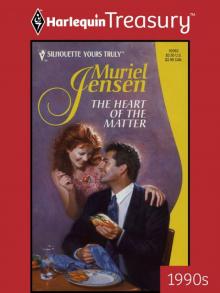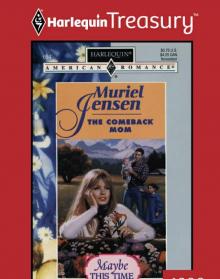- Home
- Muriel Jensen
Christmas In The Country Page 2
Christmas In The Country Read online
Page 2
But she saw none of that.
“Mr. James,” the reporter said, “Father Chabot says he owes you his life. What do you say to that?”
“I owe him mine, as well,” Jeffrey James replied. His voice was deep, quiet. “While we were being held, he was the voice of reason to me, the touch of kindness. He made it possible for me to be chained to a chair for ten weeks and not go insane. I can’t imagine how Terry Anderson dealt with being held for almost eight years.”
“And that’s why you brought him with you? Certainly you knew a seventy-year-old man would slow you down.”
James frowned at the reporter. “I brought him with me because it would have been impossible for me to leave him there.”
“He says you strapped his ribs and tended his wound.”
“Actually, a kind young woman helped us.”
“How did you get food?”
“She gave us some. When that ran out, I stole fruit and vegetables.”
The reporter smiled. “I’ll bet you’re really looking forward to some good home cooking.”
“I am,” Jeffrey James admitted heartily.
“If you could have any dish you wanted, what would it be?”
“Apricot-glazed ham” was the instant reply.
Liza felt a little tingle along her spine. No. It couldn’t be. A million women glazed ham with apricots.
“Something your mother used to make?” the reporter guessed.
James smiled and tipped his head back to lean it against the ornate chair. “No,” he said with a sigh. “One of the last television shows I saw before I left for Lebanon was a Liza De Lane Christmas special. She made an apricot-glazed ham. When I was living on garbage and rice, it was all I could think of.”
The tingle extended to every extremity in Liza’s body.
“So, food brought you home?” the reporter teased.
James thought a moment. “No, it was more than the food. I think it was…her.” He grinned wearily. “I could see her in that gingham apron, and every elemental male instinct in me identified the antiquated but still appealing concept of the nurturing woman and…I wanted her.”
Liza stared openmouthed at the screen.
Edie gasped.
Whittier applauded.
“But Mr. James,” the reporter said regretfully, “she’s married.”
Something darkened in James’s eyes. Liza knew she saw it. “Is she?” He shrugged philosophically and sighed. “Lucky guy.”
Ben Whittier aimed the remote control at the television and the screen went black. His face was animated with excitement as he turned to Liza. “Did you hear that? You brought the hero home! You! Wonder Woman’s own Liza De Lane brought an American hostage out of two and a half months’ imprisonment and provided the inspiration that helped him survive six days of terrifying danger and get himself and a comrade to safety! You, Liza. You.”
Liza felt as though someone had just hit her on the head with a large mallet and shaken everything inside. As she struggled for emotional balance, all she could think about were those clear blue eyes, and the thought that the image that had led him to escape and finally to freedom had been…her.
Her in a gingham apron.
It couldn’t be real. No man had ever reacted to her that way—or made her feel the way she felt now. Mushy. Vulnerable. Besotted by a pair of blue eyes.
“I’ve invited him to be a guest on our show,” Ben said. “It’ll be perfect. The last thing he saw before he left was you. Now one of the first things he’ll see when Washington’s finished debriefing him is you again. Liza, the ratings will go through the roof!”
Edie’s horrified dark glance caught Liza’s as Whittier got up to remove the tape from the VCR.
“Mr. Whittier,” Edie said solemnly. “There’s something we have to tell you about the show.”
Ben turned away from the television at the sound of her voice, his white eyebrows meeting in a V over the bridge of his nose. “What?”
“That we’re so excited to be doing it!” Liza gushed before Edie could speak. She sent her editor a silencing look. “We have so many cozy, homey ideas that Edie gets a little emotional about it. And now that you’ve added a true American hero to the mix, well…” She shrugged at her inability to truly express their enthusiasm.
Ben Whittier was delighted.
Edie didn’t seem to know whether to be pleased or terrified.
“Trust us, Mr. Whittier,” she said. “This will be a Christmas none of us will forget.”
Liza met Edie’s gaze, thinking that even to her own ear the words had an unsettlingly prophetic ring.
“YOU’RE INSANE,” Sherrie said. She sat across from Liza at a small table in the Rockbury Inn. Though the restaurant had just closed, Sherrie still wore her kitchen whites and chef’s hat, only permed and wispy blond bangs visible under the starched band. “I told Mom you were inferior and that we should have thrown you away the moment you arrived, but she thought I was being rash. She insisted on giving you a chance. Well, I hope she’s looking down on us now and admitting to herself that I was right all along.”
Liza took another sip of Vouvray, then looked at her sister condemningly over the rim of the glass. “How nice of you to make this easier for me. And before you go calling people insane, you might remember who agreed to help me fill the column in the first place by providing the recipes and craft instructions that have made it so popular.”
“Because you promised to pay me.”
Liza set her stemmed glass down and, holding the rim in the tips of her fingers, gave it one turn on the tablecloth. “Did I mention what your cut of this special would be?” she asked casually.
Sherrie folded her arms on the table. “Half your prison term when your boss discovers we’ve been deceiving him for a year and a half?”
“I don’t think he’d send us to jail for quadrupling circulation. You’d make a lot of money, Sherrie.”
“How much, specifically?”
Liza named a figure that was half what she’d been offered.
Sherrie snatched the wineglass out of Liza’s hand and downed the rest of the wine in one swallow. Then she put the glass down and said in a tight voice, “Say that again.”
Liza repeated the figure, then as though the impact of it wasn’t enough, she suggested its potential to change Sherrie’s life. “You could buy this place,” she said, looking around the cozy, firelit interior of the midnineteenth-century inn. It was a wonderful place that brought to mind horse-drawn coaches, men in greatcoats and women in traveling costumes stopping for refreshment and a night’s lodging. “That’s been your dream since you moved here. Now you can do it.”
Sherrie’s eyes grew misty. Liza had seen that look the night Sherrie met Tom Blake, when her children were born, and on her first day of freedom after her divorce.
Then Sherrie shook her head and leaned across the table toward Liza, the misty look overlaid by practicality. “Okay, look. I can do all the cooking for you, and you can borrow my children, since your fictitious ones are based on them, anyway. But what about the house? You said the producer wants to do outside scenes and that Mr. Whittier himself wants to be here. Where do we get the wonderful Federal mansion all your readers think you write from?”
Liza leaned toward her sister, thinking that Sherrie was one of the smartest, bravest women she knew, but a complete conehead where men were concerned.
“You really don’t recognize it?” Liza asked.
Sherrie’s brow furrowed in confusion. “Of course I don’t recognize it. You live in a Manhattan high-rise.”
“And you have no idea where I got the dining room with the Pennsylvania walnut harvest table, the five-foot-tall brick fireplace, the stenciled borders on the walls, the tall-case country clock…” Liza stopped when Sherrie. continued to look blank. “It’s Bill’s house, sis. When I dreamed up my fictitious house for the column, I just mentally moved into Bill McBride’s house.”
Sherrie sat up, stiffening.
“No,” she said simply.
Liza had been dealing with her for thirty years. She knew precisely what to do. “Okay,” she said amiably, pulling her wallet out of the envelope bag at her feet. “You’re probably right. It is insane. I just thought I’d run it by you and see what you thought.”
She put several bills on the little silver salver that held her tab.
Sherrie picked up the bills and put them back in front of Liza. “I can’t ask Bill to let us use his house,” she said firmly. “I’ve been fending him off for a year, and it would send the wrong message.”
Liza put the money back. “I understand. It’s okay. Really.”
“But what’ll you do?”
“That’s my problem.” She smiled so that she didn’t sound self-pitying. “There must be another house around here I can use.”
“What if there isn’t?”
Liza shrugged as though it didn’t matter. “I simply • tell Mr. Whittier the truth. I fully intended to do that until he came over with that video of Jeffrey James.”
Sherrie sighed and stared at the inn’s proprietor, a rotund little Italian man with graying hair, as he moved around the dining room, gathering tablecloths into bundles for the laundry and upturning chairs onto the tables to prepare to vacuum the burgundy carpet.
“Liza,” she said, focusing on her again, her eyes anxious and a little desperate. Liza understood her sister’s anguish, but she didn’t think she did. “I can’t be near him for the time it would take…”
“I know.” Liza stood and pulled on her red wool coat. “It’s hard to be around a man you love but are determined not to marry.”
Sherrie stood, too, an inch taller than Liza. “I don’t love him. How many times do I have to tell you that? He’s just the kids’ pediatrician. And even if I did love him, I wouldn’t put myself through marriage again. I like dealing with my children the way I think is right. I like knowing I can meet my budget because nobody else is siphoning off the bottom. I like going up to bed without worrying about finding my man there with another woman—because there is no man there.”
“Of course. I understand.”
“Liza, I’ve just gotten Bill to stop calling. Mercifully the kids have cooperated by being healthy, and I haven’t even had to see him professionally in two months!”
Liza took Sherrie into her arms and hugged her tightly. “Thanks for taking the time to listen. You know I’ve always appreciated that about you. I’ll be down Christmas Day just like we…”
Sherrie held her away and glared at her. “I hate it when you pretend I’m not talking!”
Liza blinked innocently. “What do you mean?”
Sherrie dropped her hands and turned away, then spun back and whipped off her hat. Long blond hair the color of candlelight fell to her shoulders. “You know what I mean,” she admonished. “You pretend to humor me and all the while your secret agenda is to make me change my mind. Well, fine! I’ll do it!” And she stormed behind the bar to the telephone.
It took Liza several seconds to realize she’d won. She did her best not to look self-satisfied when her sister reappeared, pulling on a thick blue parka.
Sherrie marched past her toward the door. “I’m doing this for the inn and for you,” she said. “And not because I want to see Bill. Come on. He’s still up. Good night, Denio.”
The man paused in his work to blow a kiss.
This should be interesting, Liza thought. She couldn’t wait to see Sherrie’s reaction when she told her she intended to ask Bill to play the part of Mr. De Lane.
Chapter Two
Jeffrey James lay in the middle of an enormous bed in the penthouse suite of the Washington Regent Hotel listening to the subtle night sounds of Washington, D.C. The room was being paid for by Whittier Publications, and Ben Whittier himself was coming in a limo for him in the morning to take him to Liza De Lane’s home in Connecticut.
He wished he’d kept his mouth shut about the apricot-glazed ham. That was what happened when a man got chatty. He talked himself into things that were better left alone. But he’d been on embassy soil after six days of being sure he’d never make it, and he’d been a little intoxicated with success.
That was how he’d gotten kidnapped in the first place. He’d defended the United States in an argument on the job and was taken for a spy.
Most religious and political fanatics had stopped taking hostages years earlier because they’d eventually realized there was little to gain by it. But the Fatwa Jihad were young and wild and thought the old lessons didn’t apply to them.
And that was just about the way his luck had been running.
He’d left Los Angeles so that he could have something else to think about after his breakup with Sylvia. Well, that had certainly happened. After nine months of overseeing the building of a freeway in heat that fused your eyelids together, he was kidnapped and tied to a chair where he was able to do nothing but think for the next ten weeks.
Then he fought his way to freedom under extremely difficult conditions, and looked for some single image to sustain him in his moments of despair. The most powerful image he could think of was that of a woman, but he didn’t have one. Sylvia had left him for a Dallas rancher.
So he distilled his vision of the American woman in general into the image of Liza De Lane—the woman who’d created that mouthwatering ham he’d caught a glimpse of on his way through Sylvia’s place to pick up the boots he’d left in a corner of her closet.
He remembered clearly that he’d hesitated in the doorway, captivated by an oval face topped with upswept golden blond hair and cocoa brown eyes that glistened from Sylvia’s television set.
She’d had pink cheeks, lips a bright fire-engine color that had caught his eye and made him focus on the shape of every word she spoke. And she’d been wearing a red-and-white gingham apron. He knew it made him a politically incorrect macho warthog, but he’d found it all a total turn-on.
Thinking back, he guessed it was because there’d been so little softness in his life at that moment, and she represented for him something irretrievably lost—and in typical warthog fashion, he lusted for it.
And now they tell him she’s married.
And then they invite him to spend Christmas with her in Connecticut—with her husband and children.
When he’d operated his own engineering firm before he’d left for Beirut, he’d had an office manager. He wondered if there was such a thing as a life manager. He understood that God was supposed to be in charge of that, but he and God hadn’t been very close since he stopped going to Sunday school in the fifth grade.
Jeff closed his eyes and sighed. Maybe that was why his life was such a wreck. God had it in for him for abandonment.
IN THE FOUR DAYS since Bill had agreed to let Liza take over his home as her own from the twenty-first of December through Christmas Eve, Sherrie had done a masterful job of decorating the interior. Liza stood in the middle of the living room and looked around in awe.
Dora, Bill McBride’s housekeeper, took Liza’s bags. “Sit down, Miss De Lane…” She paused to hunch her plump shoulders and grin conspiratorially. “I mean, Mrs. McBride…and I’ll tell your husband you’re here.” She went off toward the kitchen, giggling.
Looking around, Liza realized, not for the first time, that her sister was a creative genius. Sherrie had brought Christmas to the country, big-time.
When Bill McBride had bought and redecorated the house five years earlier, he’d restored important architectural details such as the wooden mantel and the small-paned windows.
Now, with a fire in the fireplace and the soft light of evening warming the creamy white walls and the stenciled borders under the crown molding, Liza half expected some wealthy merchant in colonial garb to walk down the maple stairway, his arms loaded with packages.
Sherrie had decorated the mantel with pine boughs and tall candlesticks with red tapers. Pine garlands, hung at intervals with wooden bird ornaments, were strung along the stairw
ay’s balustrade.
A red, green and white quilt was thrown over the back of a sofa upholstered in a brick red color sprinkled with tiny cream dots. A matching wing chair stood on one side of the fireplace, and another wing chair in a coordinating pattern occupied the other side.
A small quilt throw covered a low table before the sofa, and on it was a white teapot and a plate of cookies.
Liza had sent Sherrie all the family portraits that decorated her wall in the apartment in Manhattan, and her sister had placed them above the fireplace, using a large, ornately framed photo of their greatgrandparents’ wedding as the centerpiece.
Liza choked.
She felt emotion swell in her chest, close her throat, fill her eyes, and she couldn’t explain it precisely, unless it was guilt that she’d brought all these loving people from her past into her holiday play. All the smiling faces who’d passed love down the generations now looked down on her and probably wondered what in the hell she was doing.
She sniffed, swallowed and patted her hair. She knew what she was doing. She was getting Sherrie the money to buy the inn, saving Edie’s job, and…and making Ben Whittier happy.
But what was she doing for herself?
She knew that, too. She was giving herself the opportunity to meet the man who’d seen her on television and used her face as an icon in a dark hour to get himself home.
She trembled just a little at the knowledge that she’d had that effect on someone.
She turned as she caught sight of glowing color in her peripheral vision and saw what had to be the tallest, fattest, most perfectly shaped Christmas tree in the entire world. And it had been decorated with gaudy splendor.
There were hundreds of colorful lights on it, garlands of popcorn and cranberries alternately strung, traditional glass balls, wooden ornaments, tin and crystal ornaments to catch and reflect the light, and it was topped by a tall, lacy angel who held a candle whose flame was also a light. The area under the bottom boughs was stacked with brightly wrapped presents.

 Christmas In The Country
Christmas In The Country Blown Away
Blown Away In My Dreams
In My Dreams The Heart of the Matter
The Heart of the Matter New Year's Wedding
New Year's Wedding Always Florence
Always Florence The Comeback Mom
The Comeback Mom To Love and Protect
To Love and Protect Jackpot Baby
Jackpot Baby The Man She Married
The Man She Married Love Me Forever
Love Me Forever